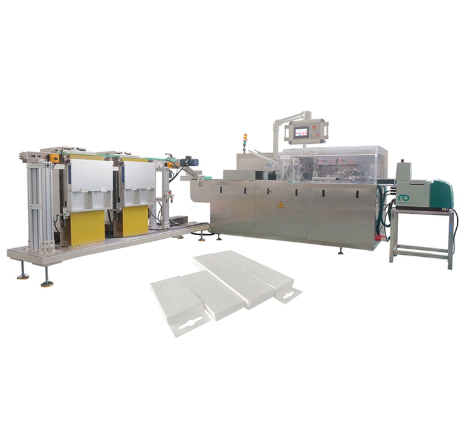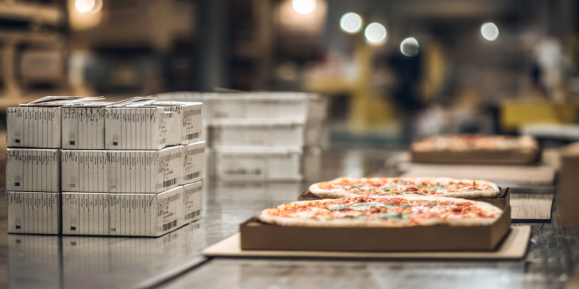Views: 0 Author: Site Editor Publish Time: 2025-08-19 Origin: Site






In the fast-paced world of pharmaceutical and food manufacturing, efficient and reliable packaging solutions are paramount. Cartoning machines play a crucial role in ensuring that products are securely packaged, meet regulatory standards, and are ready for distribution. This article delves into the significance of cartoning machines in these industries, focusing on the offerings of Zhejiang Chengda Machinery Co., Ltd., a leading manufacturer in the field.
A cartoning machine is a sophisticated packaging device engineered to streamline the packaging process by forming, filling, and sealing cartons with remarkable precision and speed. These machines are designed to handle a wide range of products, from small blister packs to larger multi-pack configurations, ensuring that each carton is filled accurately and sealed securely. By automating the process of erecting cartons, inserting products, adding leaflets, and sealing the cartons, cartoning machines significantly enhance efficiency and consistency in packaging operations, reducing the risk of human error and increasing overall productivity.

In the pharmaceutical sector, packaging is not just about presentation—it’s a critical component of product safety and regulatory compliance. Cartoning machines play a pivotal role in ensuring that medications and medical devices are packaged to the highest standards. Here’s a deeper look at how these machines are indispensable in the pharmaceutical industry:
Pharmaceutical companies must adhere to Good Manufacturing Practices (GMP) to ensure that their products are consistently produced and controlled according to quality standards. Cartoning machines are designed to meet these stringent regulations, providing a controlled and consistent packaging process. Features such as automated loading, precision sealing, and real-time monitoring ensure that every carton is packed correctly, reducing the risk of human error and contamination.
Consumer safety is paramount in the pharmaceutical industry. Cartoning machines offer tamper-evident packaging solutions that provide assurance to consumers that the product has not been tampered with. This is achieved through features like tamper-evident seals, unique packaging designs, and the integration of serialization systems that track each product from production to sale.
Blister packs are a common packaging format in the pharmaceutical industry, used for tablets, capsules, and other small items. Cartoning machines are designed to handle these blister packs efficiently, automating the insertion process and ensuring that each pack is securely placed within the carton. This not only speeds up the packaging process but also reduces the risk of damage to the blister packs.
Serialization is a critical aspect of pharmaceutical packaging, enabling traceability and anti-counterfeiting measures. Cartoning machines can be integrated with serialization systems to print unique serial numbers, barcodes, or QR codes on each carton. This allows for detailed tracking of products, ensuring that they can be traced back to their point of origin and verifying their authenticity.
Pharmaceutical products are often sensitive to environmental factors such as light, moisture, and temperature. Cartoning machines use materials and designs that protect the integrity of these products. For example, cartons can be made from materials that block UV light, and the design can include features that prevent moisture ingress. This ensures that the products remain effective and safe for use.
The food industry requires packaging solutions that not only protect the product but also meet strict hygiene standards and appeal to consumers. Cartoning machines offer a versatile and efficient solution that meets these needs:
Food safety is a top priority, and cartoning machines are designed to maintain the highest hygiene standards. They use materials that are food-grade and resistant to contamination. The machines are also designed to be easy to clean and sanitize, ensuring that they do not become a source of contamination themselves.
In the retail environment, presentation is key. Cartoning machines can produce cartons that are ready for display on store shelves, reducing the need for additional packaging or handling. This not only saves time and labor but also enhances the visual appeal of the products, making them more attractive to consumers.
The food industry is diverse, with products ranging from small snacks to large bottles of beverages. Cartoning machines are highly adaptable and can handle a wide variety of product formats. They can be adjusted to accommodate different sizes and shapes, ensuring that each product is packaged correctly.
During transportation and storage, food products are exposed to various environmental factors that can affect their quality. Cartoning machines ensure that products are protected from damage, whether it’s from physical impact, moisture, or other external factors. This helps to maintain the freshness and quality of the products, ensuring that they reach consumers in the best possible condition.
Cartoning machines can also enhance the consumer experience by providing easy-to-open packaging and clear labeling. Features such as easy-tear notches and transparent windows allow consumers to see the product inside, increasing their confidence in the product. Additionally, the ability to print detailed information on the cartons, such as nutritional information and usage instructions, provides valuable information to consumers.
With increasing focus on environmental sustainability, cartoning machines can play a role in reducing waste. They can be designed to use minimal materials and can be adjusted to produce cartons that are just the right size for the product, reducing excess packaging. Additionally, many cartoning machines can be integrated with recycling systems, further supporting sustainable practices.

When selecting a cartoning machine for pharmaceutical or food applications, several critical features determine efficiency, reliability, and compliance. Understanding these features ensures optimal packaging performance and adherence to industry standards.
Pharmaceutical and food production lines often operate at high volumes. The cartoning machine should match the desired output, whether it is a moderate-scale line for specialty products or a high-speed line for mass production. Adjustable speed settings allow manufacturers to balance throughput with precision, ensuring both quality and efficiency.
A versatile cartoning machine can handle various carton sizes and product types without extensive reconfiguration. Flexibility is essential for companies that package multiple product lines, such as different bottle sizes, blister packs, or sachets. Machines with adjustable guides and modular feeders allow seamless transitions between product formats, reducing downtime and enhancing operational efficiency.
Modern cartoning machines range from semi-automatic to fully automated systems. The level of automation impacts labor requirements, consistency, and speed. Fully automated machines minimize manual intervention, reducing human error and labor costs, while semi-automatic machines may offer a cost-effective solution for smaller production runs.
Cartoning machines must accommodate a variety of carton materials, including different thicknesses and folding styles. Ensuring the machine can accurately handle the selected cardboard type prevents misfeeds, jams, or carton damage. Compatibility with standard folding types, such as tuck-end or crash-lock, also ensures smooth operation across diverse packaging designs.
For both pharmaceutical and food applications, hygiene is critical. Cartoning machines should be designed for easy cleaning, with smooth surfaces and minimal crevices to prevent contamination. Compliance with FDA, ISO, or other relevant food and pharmaceutical standards ensures the packaging process meets strict safety and cleanliness requirements.
Efficient packaging lines require seamless integration of the cartoning machine with upstream and downstream equipment, such as blister machines, filling systems, labeling machines, or checkweighers. Proper integration ensures synchronized operation, reduces bottlenecks, and maintains consistent product quality throughout the packaging process.
The packaging industry is evolving rapidly, and cartoning machines are at the forefront of innovation. Modern technologies not only increase efficiency but also enhance product safety, flexibility, and sustainability for pharmaceutical and food applications.
Advanced cartoning machines now operate at higher speeds without compromising accuracy. Intelligent controls allow for real-time monitoring and adaptive adjustments, ensuring that even complex or delicate products are packaged consistently and efficiently. These systems are designed to optimize production throughput while minimizing errors and downtime.
Smart cartoning machines leverage IoT connectivity and Industry 4.0 principles for seamless data exchange across production lines. Real-time performance monitoring, predictive maintenance alerts, and analytics-driven optimization improve reliability, reduce downtime, and enable better resource management across the facility.
Sustainability has become a critical focus in both food and pharmaceutical packaging. Innovative cartoning machines support recyclable cartons and minimize material waste through precise cutting, folding, and sealing mechanisms. These environmentally friendly practices help companies meet regulatory requirements and consumer expectations for sustainable packaging.
Yes. Modern cartoning machines are designed with gentle handling systems and adjustable speed controls to protect delicate items such as chocolates, cookies, and soft candies while ensuring proper carton alignment and sealing.
Machines are designed with smooth surfaces, minimal crevices, and stainless steel components for easy cleaning. Many comply with FDA and ISO standards, ensuring contamination-free packaging. Automated systems reduce manual handling, further enhancing hygiene.
Machines with adjustable guides, modular units, and flexible feeders can handle various carton sizes and product formats. This flexibility is crucial for companies packaging multiple products or changing batch sizes without extensive downtime.
Yes. Modern cartoning machines can handle recyclable materials, optimize material usage, and reduce waste. Many are designed to work with sustainable carton designs, helping companies meet environmental regulations and consumer expectations.
Cartoning machines are indispensable in the pharmaceutical and food industries, streamlining packaging processes and ensuring product safety. Zhejiang Chengda Machinery Co., Ltd. provides advanced solutions that cater to the unique needs of these sectors. By investing in quality cartoning machines, manufacturers can enhance efficiency, comply with regulations, and deliver superior products to consumers.
